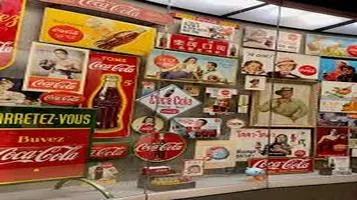Coca-Cola: A Timeless Classic in the World of Beverages
Coca-Cola, an iconic global beverage brand, has consistently made its mark on various "best" lists, celebrated for its enduring popularity and innovative marketing strategies. Known for its classic, refreshing taste, Coca-Cola often ranks at the top in beverage preference surveys worldwide. Its branding, recognized by the signature red and white logo, is frequently highlighted in lists of the most valuable and recognizable brands. Coca-Cola's advertising campaigns, including memorable slogans like "Taste the Feeling," have earned spots on best advertising lists for their creativity and impact. Additionally, Coca-Cola’s commitment to sustainability and community engagement has been acknowledged in corporate responsibility rankings. The brand's ability to adapt and innovate while maintaining its core identity ensures its continued prominence on best-of lists globally.

Coca-Cola, a brand synonymous with refreshment and enjoyment, has been a staple in the global beverage market for over a century. Its ubiquitous presence and enduring popularity make it a subject of fascination for both casual drinkers and beverage connoisseurs. This review delves into the best aspects of Coca-Cola, exploring its history, flavor profile, cultural impact, and various iterations that have kept it at the forefront of the soft drink industry.
Historical Significance
Coca-Cola's origins date back to 1886 when Dr. John S. Pemberton, a pharmacist in Atlanta, Georgia, concocted the first batch of what would become the world’s most famous soft drink. Initially marketed as a medicinal tonic, Coca-Cola quickly transitioned into a refreshing beverage. The brand's iconic logo and the distinct contour bottle, introduced in 1915, have become symbols of American culture and ingenuity.
The longevity of Coca-Cola is a testament to its ability to adapt and innovate while maintaining its core identity. During World War II, Coca-Cola even played a role in boosting American morale, with the company pledging to provide Coke to every U.S. soldier wherever they were stationed. This move not only solidified its place in American hearts but also expanded its global reach.
Flavor Profile
The flavor of Coca-Cola is both simple and complex. The primary taste is a balance of sweetness and acidity, with a subtle hint of vanilla and an underlying caramel note. The exact formula is famously secret, known to only a few people, which adds an element of mystique to its allure. The carbonation provides a pleasant bite that complements the syrupy sweetness, making it incredibly refreshing, especially when served ice-cold.
One of the most remarkable aspects of Coca-Cola's flavor is its consistency. Whether you're drinking it from a can, a bottle, or a fountain, the taste remains reliably the same. This consistency has been a cornerstone of the brand's success, ensuring that customers always know what to expect.
Cultural Impact
Coca-Cola is more than just a beverage; it is a cultural phenomenon. The brand has been a part of countless advertising campaigns that have become iconic in their own right. From the early "I'd Like to Buy the World a Coke" campaign to the heartwarming holiday ads featuring Santa Claus, Coca-Cola has mastered the art of connecting with its audience on an emotional level.
The brand's impact extends beyond advertising. Coca-Cola has been a part of major cultural and historical events. It was the first soft drink to be consumed in space when astronauts aboard the Space Shuttle Challenger sipped from a specially designed Coke can in 1985. The brand has also been a sponsor of the Olympic Games since 1928, further cementing its global presence.
Varieties and Innovations
While the classic Coca-Cola remains the flagship product, the company has introduced numerous variations to cater to evolving consumer preferences. Diet Coke, launched in 1982, was one of the first major attempts to offer a low-calorie alternative without sacrificing flavor. Coca-Cola Zero Sugar, introduced in 2005, aimed to provide a taste closer to the original while still being calorie-free.
Other notable variations include Cherry Coke, Vanilla Coke, and the more recent Coca-Cola with Coffee, which combines the classic taste with a caffeine boost. These innovations demonstrate the brand's ability to stay relevant and cater to diverse tastes.
Environmental and Social Responsibility
In recent years, Coca-Cola has made strides in addressing environmental and social issues. The company has committed to ambitious sustainability goals, including using 50% recycled material in its packaging by 2030 and reducing its carbon footprint. Initiatives like "World Without Waste" aim to collect and recycle a bottle or can for every one sold by 2030.
On the social front, Coca-Cola has a long history of philanthropy and community engagement. The Coca-Cola Foundation has donated millions to various causes, including disaster relief, education, and clean water initiatives.
Conclusion
Coca-Cola's enduring success is a blend of its rich history, consistent flavor, cultural resonance, and ability to innovate. It is a brand that has not only quenched the thirst of millions but has also become a part of their lives. Whether you're enjoying a classic Coke on a hot summer day or exploring one of its many variations, there's no denying the unique and lasting appeal of Coca-Cola.
In a world where trends come and go, Coca-Cola remains a timeless classic, a testament to the power of a simple idea executed to perfection. It is more than just a drink; it is a global icon that continues to refresh the world, one sip at a time.






